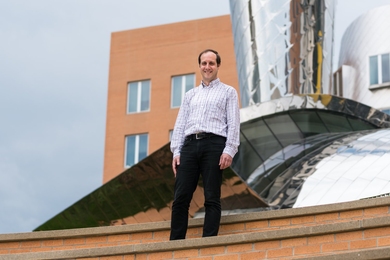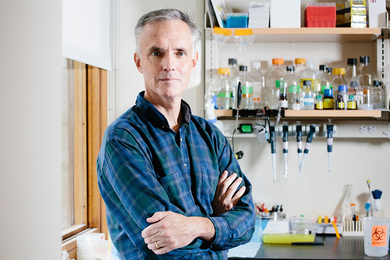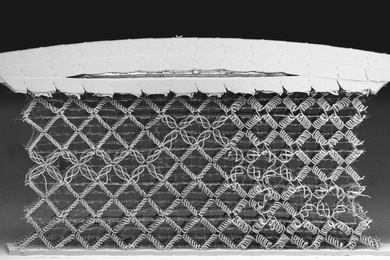Biology professor Richard O. Hynes became the sixth MIT scientist to win the prestigious Gairdner Foundation International Award last week, a honor that is frequently a prelude to winning a Nobel Prize.
Since its establishment in 1957 by the late James A. Gairdner to recognize outstanding contributions to medical science, the Toronto-based foundation has honored 248 scientists, 48 of whom subsequently won a Nobel Prize, three of them affiliated with MIT. Previous MIT winners are Professors Robert S. Langer Jr. in 1996, Robert Weinberg in 1992, Phillip Sharp in 1986, Susumu Tonegawa in 1983 and David Baltimore in 1974. The last three went on to win Nobel Prizes.
Each Gairdner winner receives a $30,000 prize in Canadian money (about $22,500 U.S.) and is invited to lecture at the University of Toronto in October.
Professor Hynes and Dr. Erkki Ruoslahti of the Burman Institute in La Jolla, Calif., and the University of California in San Diego were honored jointly for their study of the interaction among cells and with the extracellular matrix that surrounds them.
Both investigators have been at the forefront of research which led to the discovery of proteins responsible for the activities, including fibronectins and integrins. Dr. Hynes has used genetic approaches to analyze the functions of fibronectin and intergrin and identified the critical roles they play in embryogenesis. Dr. Ruoslahti has focused on peptide mimics of adhesion proteins and, more recently, signal transduction aspects of cell-extracellular matrix interactions.
"This research is advancing our understanding of such processes as cell differentiation and proliferation, as well as of cell adhesion and mobility," the award citation said. "It also holds the promise for the development of novel therapies for a number of diseases including thrombosis, inflammation and cancer."
A native of the United Kingdom, Professor Hynes has a BA and MA in biochemistry from Cambridge University and was awarded a PhD by MIT in 1971. He was a research fellow at the Imperial Cancer Research Fund in London for three years before returning to MIT as an assistant professor in 1975.
Dr. Hynes was promoted to professor in the Department of Biology in 1983 and served as the head of the department from 1989-91. He joined the Howard Hughes Medical Institute as an investigator in 1988 and has been the director of MIT's Center for Cancer Research since 1991, swapping roles with Professor Sharp, who became the head of the Department of Biology.
The other 1997 Gairdner winners are Corey S. Goodman, Professor of Neurobiology at the Howard Hughes Medical Institute at the University of California in Berkeley, and Dr. Alfred Knudson, distinguished scientist at the Fox Chase Center in Philadelphia
Dr. Goodman's award recognizes his novel and creative studies on the molecular basis of axon guidance, a fundamental problem of neuronal development.
Dr. Knudson was cited for making a breakthrough contribution to the understanding of the genetic basis of cancer in the 1970s by doing statistical analysis of retinoblastoma. A corollary of this idea was that the genetic study of hereditary cancer could be informative about the non-hereditary forms of the same cancers.





